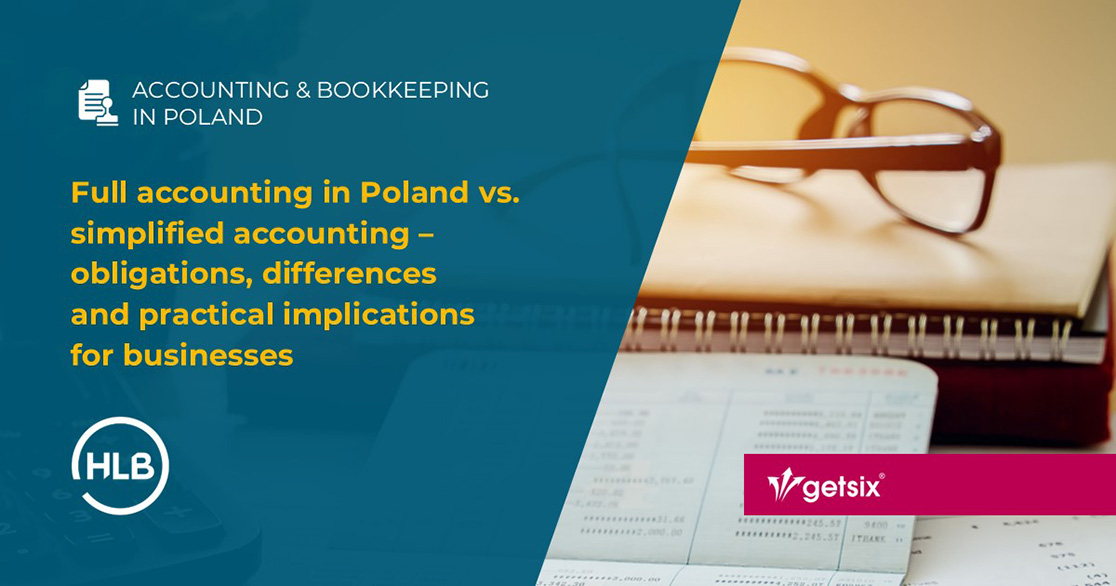Full accounting in Poland vs. simplified accounting – obligations, differences and practical implications for businesses
15 May 2025
15 May 2025

The rules for maintaining accounting records in Poland are strictly defined by legal regulations, primarily the Polish Accounting Act of 29 September 1994, and the Personal Income Tax Act (PIT Act). Depending on the scale of activity, legal form, and level of revenue, entrepreneurs in Poland may apply simplified accounting or may be legally required to adopt full accounting in Poland. It is important to emphasise clearly: full accounting is not a matter of choice in many cases, but a statutory obligation under Polish law.
According to Article 2 of the Polish Accounting Act, the obligation to maintain full accounting applies to:
In addition, full accounting in Poland may be voluntarily adopted by entities that have not yet exceeded the statutory threshold but wish to increase financial transparency or prepare for a change in legal form.
Full accounting is an advanced financial recording system that enables comprehensive management of a company’s assets, liabilities, and financial results. It requires compliance with accounting principles such as:
Under Polish regulations, the entrepreneur (or the accounting office) is obliged to:
Although full accounting in Poland is mandatory for many businesses, there are also reasons to adopt it voluntarily. The main benefits include:
Entrepreneurs who fail to maintain full accounting despite being legally obliged to do so risk:
Simplified accounting in Poland is permitted only for entities that did not exceed the revenue limit of EUR 2 million in the previous year and operate as a sole proprietorship or as civil law, registered, or professional partnerships owned by natural persons.
Simplified accounting may take one of three forms:
Under simplified accounting in Poland, the entrepreneur is not obliged to prepare a balance sheet, maintain analytical accounts, or conduct regular inventory.
| Scope | Full accounting in Poland | Simplified accounting in Poland |
|---|---|---|
| Form of record-keeping | Accounting books under the Polish Accounting Act | PKPiR, lump-sum, tax card |
| Legal obligation | Mandatory upon exceeding revenue/legal thresholds | Permitted only in specific, defined cases |
| Financial reporting | Balance sheet, P&L, notes, cash flow statements | No reporting obligation |
| Cost and complexity | High – requires expertise and experience | Lower – can be handled independently |
| Financial control level | High – enables profitability analysis and planning | Limited – harder to assess financial standing |
| Access to financing | Easier due to transparency and reporting | More difficult due to limited documentation |
Full accounting in Poland is not just a legal obligation but also a strategic business management tool. Unlike simplified forms of record-keeping, it enables real control over finances, profitability analysis, risk management, and professional preparation for cooperation with investors and financial institutions.
On the other hand, for small businesses and sole proprietorships, simplified accounting in Poland can offer real convenience – provided that eligibility criteria are met.
Regardless of whether full accounting in Poland is a legal requirement or a strategic business decision for your company – it is essential to ensure compliance with Polish regulations and efficient financial management. getsix® offers comprehensive support in full accounting services in Poland – from day-to-day bookkeeping to the preparation of financial statements. Contact us to learn more.
If you have any further questions or require additional information, please contact your business relationship person or use the enquiry form on the HLB Poland website.
***
Download the brochures providing general information and outlining the services that are offered by HLB member firms.
Learn moreClick below for more detailed information regarding population, major towns and cities, language, religion and holidays in Poland.
Learn more